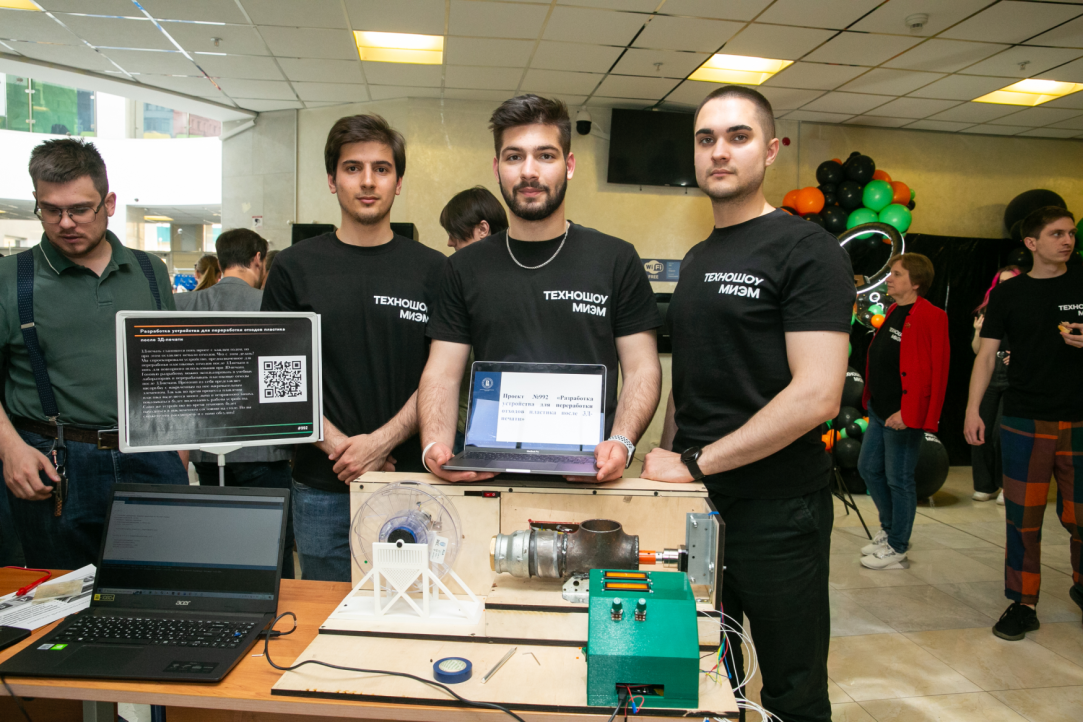Interdisciplinary Interaction and Commercialisation of Products: Report on the HSE TechnoShow

On May 30th, the traditional HSE TechnoShow—the final exhibition of the best works by student teams during the 2021/22 academic year project cycle—took place in the HSE Tikhonov Moscow Institute of Electronics and Mathematics (MIEM HSE). For the first time since the pandemic began, the festival was held offline. Visitors to the show included not only students and professors of HSE University, but also a wide variety of interested people.
Visitors to the event had access to lectures and exhibitions, as well as a photo-zone and a food court. For those visiting MIEM for the first time, there was a detailed presentation on the activities of the university.
The six clusters of the showroom—Security, Business Solutions, Video Technologies, Virtual Worlds, Modelling of Complex Systems, and Digital Education—were represented by the 34 best works of this academic year. Among them were software, combined hardware/software, and research projects created in cooperation with companies from commercial sectors of the economy, supported by university scientists. As HSE Vice-President Igor Agamirzian noted, these projects are achieving a new high: ‘There are a number of industrial projects, and I am very glad that global achievements in the sphere of free software are being used. The progress of our project work at this institute is very clear to see’
The variety of topics was surprisingly wide: in a single space you could develop your own video game location, immerse yourself in advanced hydrogen energy technologies, use visual clues from a robot to assemble parts of mechanisms, and even take part in a new academic video conference. Visitors to the TechnoShow were particularly taken with the interdisciplinary nature of the projects, not only at the level of interaction between various educational programmes of MIEM, but also the joint project work with other faculties of HSE University.
‘HSE University has always been focused on close interdisciplinary cooperation,’ said Yaroslav Kuzminov, HSE Academic Supervisor. ‘It is very nice to see the way MIEM builds cooperation with other faculties, with the HSE Art and Design School, for example. In this sense, I find the projects that go beyond the traditional range of purely MIEM solutions the most interesting. These are projects that combine chemical technologies, design, even biology.’
Numerous guests of the TechnoShow, including business representatives, partner companies and educational institutions, mentioned the relaxed atmosphere of professional dialogue, exchange of opinions and joint discussion of the presented works. As Yaroslav Kuzminov noted, ‘if three years ago (in 2019, at the last offline TechnoShow before the pandemic. — Ed.) everyone was focused on showing their works to our guests, now we can see that they also want to show them to each other!’
Ivan Pokrovsky, Executive Director of the Association of Electronics Developers and Manufacturers, was especially pleased with the openness and positive energy of the participants at the TechnoShow. ‘We came here with our colleagues from the Association hoping to find future employees for private companies in the field of electronics. I have been to MIEM before and seen the laboratories. I liked the way the project work is organised: the students work with modern components, they know how to design equipment using programmable logic, they know how to work with microcontrollers from different manufacturers, including Russian ones. With these skills, I think the participants will be able to find success in many different fields.’
In parallel with the participants' presentations in the lecture zone, visitors were able to talk to specialists from partner companies who were giving presentations on relevant topics. They discussed trends in modern education, prospects for the video game industry, and innovations in mobile application development. These meetings were particularly interesting, not only because of the relevance of the issues raised, but also because of the format: the speakers focused on the student audience and helped listeners to form an idea about the real challenges facing the industry and possible methods for solving them.
Both guests and MIEM representatives paid a lot of attention to the potential for developing project activities at the institute. According to Veronika Prokhorova, Deputy Director of MIEM HSE, the main course is now aimed at making sure products have a commercial bent: ‘We already have a very large number of customers, and it is growing year by year. We are moving to a new level, where we have major partners with whom we expect to take on a large number of interesting projects. Going offline allows us to dramatically increase the number of hardware projects, which obviously make us happier. In addition, in the very near future we plan to make significant changes to the project work carried out in the master's programme.’
This year’s TechnoShow will be remembered not only for its ambitious work, but also for its stylish environment. Designing the event, preparing the showroom, decorating the welcome and photo zones, creating the website and, of course, conducting the festival itself—for all this, special thanks must go to the ‘Movement’ student organisation of MIEM.
Material prepared by Valentina Kasilova (MIEM Media Centre)

